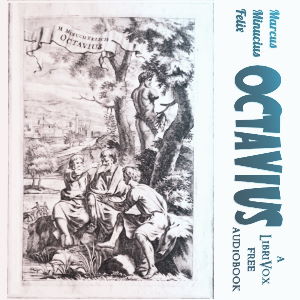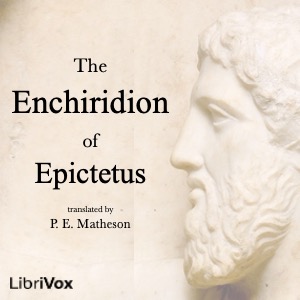La naturaleza de la santidad, o usando el lenguaje de Platón, lo santo, ocupa el fondo del diálogo; y un supuesto encuentro del adivino Eutifrón con Sócrates es lo que da origen a la cuestión. Eutifrón pretende realizar un acto santo, reclamado por la justicia, pidiendo, con ocasión de la muerte de un esclavo, una condena contra su padre. Sócrates representa en este caso la conciencia moral y la razón. (Patricio de Azcárate) Grabación realizada en colaboración: Tux, Epachuko y KevinS. La composición se terminó durante la pandemia del Covid-19, en abril de 2020.
1 episodes
The Consolation of Philosophy was written about 524 A.D. and has been called one of the most popular and influential books ever written. The book is presented as a dialogue between Boethius, the author, and Lady Philosophy, his tutor. Through her teaching, Boethius learns the true nature of fortune, misfortune, wealth, good, and evil.This dramatic reading is an attempt to present this wonderful work in an audio format while maintaining the dialogic structure of the work. (Devorah Allen)Cast ListBoethius, the Narrator: Larry WilsonPhilosophy: Devorah AllenHeadings and Footnotes: KevinS
8 episodes
This ancient Roman dialogue plays out as a religious debate between the Christian lawyer Octavius, and his close friend, a skeptical pagan named Caecilius. Caecilius is relatively agnostic, expressing skepticism towards both aspects of traditional Roman paganism, as well as towards his friend's newfangled Christian religion. Octavius attempts to give the reasons he has for his own beliefs and answer Caecilius' critiques. The author- Marcus Minucius Felix - plays the role of referee and observer. This is one of the earliest Latin texts to talk about Christianity, and describe how the new religion fit in the wider social context of the Roman world. (Summary by Adam Bielka)
Cast:
Marcus, the narrator: KevinS
Octavius, a Christian lawyer: cadastra
Caecilius, a pagan friend of Octavius: Adam Bielka
Audio edited by Adam Bielka
6 episodes
The Enchiridion (also translated as “Handbook” or “Manual”) of Epictetus is a short collection of Stoic precepts compiled by Arrian, a student of Epictetus. Epictetus (c. 50 – 135 AD) was a Greek philosopher and a champion of Stoicism, a philosophy dedicated to tranquility of the mind and soul via practical, actionable advice. Popular in the ancient and medieval world, it has even found favor in the contemporary military; fighter pilot James Stockdale attributed his survival of over seven years as a prisoner of war to the way of thinking contained in this short work. (summary written by John Pederson)
5 episodes

The Yoga Sutras of Patanjali are in themselves exceedingly brief, less than ten pages of large type in the original. Yet they contain the essence of practical wisdom, set forth in admirable order and detail. The theme, if the present interpreter be right, is the great regeneration, the birth of the spiritual from the psychical man: the same theme which Paul so wisely and eloquently set forth in writing to his disciples in Corinth, the theme of all mystics in all lands.We think of ourselves as living a purely physical life, in these material bodies of ours. In reality, we have gone far indeed from pure physical life; for ages, our life has been psychical, we have been centerd and immersed in the psychic nature. Some of the schools of India say that the psychic nature is, as it were, a looking-glass, wherein are mirrored the things seen by the physical eyes, and heard by the physical ears. But this is a magic mirror; the images remain, and take a certain life of their own. Thus within the psychic realm of our life there grows up an imaged world wherein we dwell; a world of the images of things seen and heard, and therefore a world of memories; a world also of hopes and desires, of fears and regrets. Mental life grows up among these images, built on a measuring and comparing, on the massing of images together into general ideas; on the abstraction of new notions and images from these; till a new world is built up within, full of desires and hates, ambition, envy, longing, speculation, curiosity, self-will, self-interest.The teaching of the East is, that all these are true powers overlaid by false desires; that though in manifestation psychical, they are in essence spiritual; that the psychical man is the veil and prophecy of the spiritual man. The purpose of life, therefore, is the realizing of that prophecy; the unveiling of the immortal man; the birth of the spiritual from the psychical, whereby we enter our divine inheritance and come to inhabit Eternity. This is, indeed, salvation, the purpose of all true religion, in all times.Patanjali has in mind the spiritual man, to be born from the psychical. His purpose is, to set in order the practical means for the unveiling and regeneration, and to indicate the fruit, the glory and the power, of that new birth. - Summary by Charles Johnston
4 episodes




